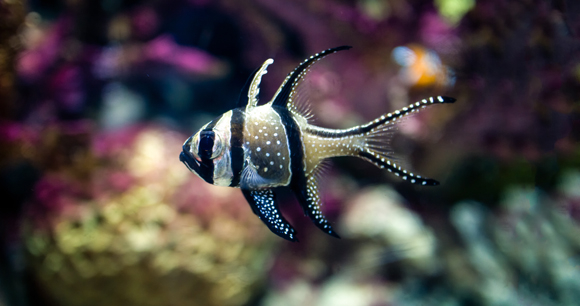
Threatened by Aquarium Trade, Indonesian Fish Has Declined by Up to 90 Percent
Washington, DC—Conservation groups filed a petition today urging the National Marine Fisheries Service (NMFS) to ban the import and sale of threatened Banggai cardinalfish from Indonesia.
The Banggai cardinalfish—a coral reef inhabitant noted for its bold black bands and white-speckled fins—has seen its numbers plummet by as much as 90 percent since the 1990s, due to decades of overexploitation by the aquarium trade. The United States has long been a major importer of the cardinalfish and is the world’s largest importer of coral reef wildlife overall, responsible for about 60 percent of the global market.
“These tiny fish need a helping hand to pull them off the path to extinction,” said Dianne DuBois, a staff scientist at the Center for Biological Diversity. “If the United States continues to import Banggai cardinalfish, there simply won’t be any left to take from the wild. US officials need to quickly halt imports and sales of these imperiled animals.”
In 2016, NMFS listed the Banggai cardinalfish as “threatened” under the Endangered Species Act, yet failed to offer the species any protections from trade. Today’s petition calls for a ban on imports and sale of the fish to reduce threats from the US aquarium trade.
“Indonesia has repeatedly broken its promise to adequately protect the Banggai cardinalfish and its habitat,” said DJ Schubert, wildlife biologist at the Animal Welfare Institute. It’s time for the NMFS to exercise its authority under the Endangered Species Act and turn the tide for this vulnerable reef fish.”
Banggai cardinalfish once flourished in the coral reefs of Indonesia’s Banggai Islands. But they are now limited to small, isolated populations because of exploitation from the pet trade, habitat loss, and climate change. Several populations have been completely wiped out.
“The tragic status of the Banggai cardinalfish is another example of how we are overexploiting unique marine species to satisfy the aquarium industry,” said Alejandra Goyenechea, senior international counsel at Defenders of Wildlife. “This fish has been targeted for more than 30 years by the American aquarium trade, suffering a staggering loss of 90 percent of its total population. We urge NMFS to take the lead and grant this fish the vital protections it needs under the Endangered Species Act before we lose the species forever.”
Beyond their striking appearance, Banggai cardinalfish are unusual because males are mouthbrooders. A male sucks up the eggs, and, while they incubate in his mouth, the female defends her mate.
Coral reef ecosystems are increasingly becoming uninhabitable by Banggai cardinalfish due to coral bleaching, the loss of sea anemones and urchins, and sea level rise and temperature increases from climate change. This species cannot survive these compounding threats if such conditions are allowed to remain and its populations continue to be exploited by the aquarium trade.
- Marjorie Fishman, Animal Welfare Institute
[email protected], (202) 446-2128 - Dianne Dubois, Center for Biological Diversity
[email protected], (413) 530-9257 - Kerry Skiff, Defenders of Wildlife
[email protected], (202) 772-0253
The Animal Welfare Institute (awionline.org) is a nonprofit charitable organization founded in 1951 and dedicated to reducing animal suffering caused by people. AWI engages policymakers, scientists, industry, and the public to achieve better treatment of animals everywhere—in the laboratory, on the farm, in commerce, at home, and in the wild. Follow us on Facebook, Twitter, and Instagram for updates and other important animal protection news.
The Center for Biological Diversity is a national, nonprofit conservation organization with more than 1.7 million members and online activists dedicated to the protection of endangered species and wild places.
Defenders of Wildlife is dedicated to the protection of all native animals and plants in their natural communities. With nearly 2.2 million members and activists, Defenders of Wildlife is a leading advocate for innovative solutions to safeguard our wildlife heritage for generations to come. For more information, visit defenders.org/newsroom and follow us on Twitter @Defenders.